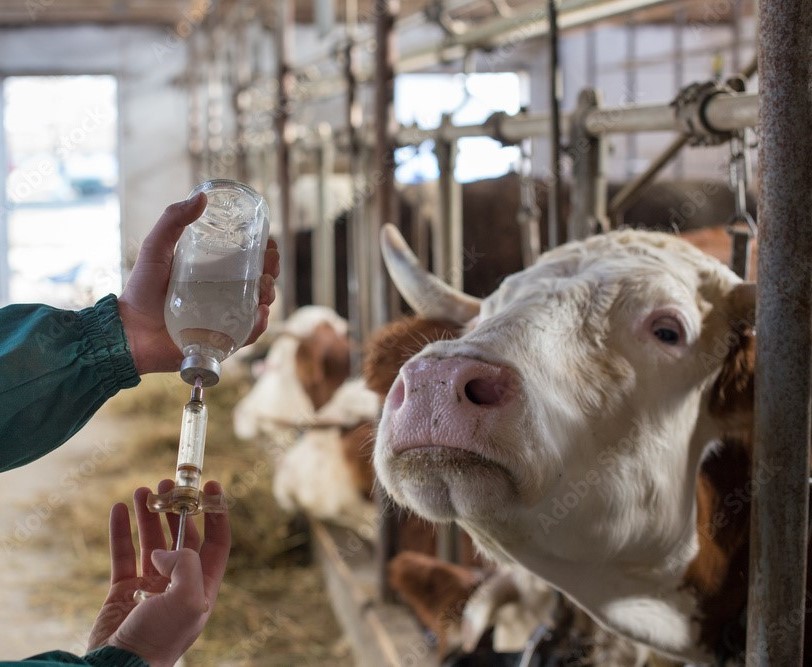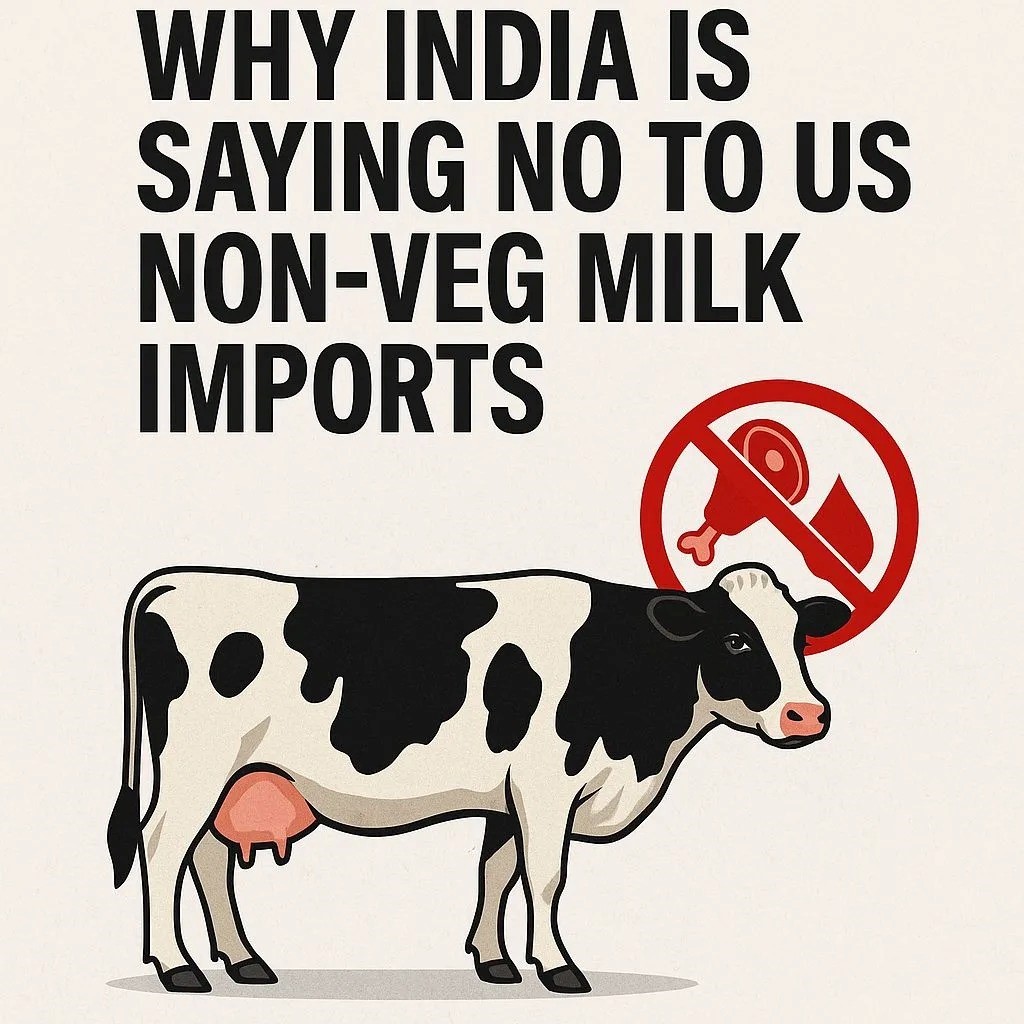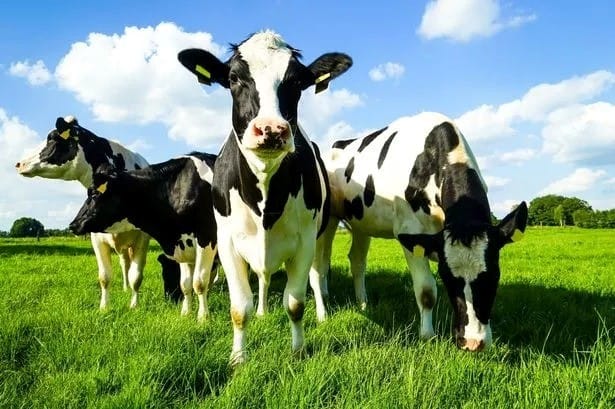
🧭 Introduction: The Unusual Trade Dispute Over Non-Veg Milk
When most people hear about trade deals, they expect talks on tariffs, defense, or technology. But in the ongoing India–US trade discussions, a surprising and culturally sensitive issue has emerged—non-veg milk. This term, now trending across Indian media, has become a hot-button topic with implications on religious sentiment, food ethics, health concerns, and national policy
🥩 What Is ‘Non-Veg Milk’? Understanding the Term

The term non-veg milk refers to dairy products—primarily milk—that are produced using animal-based enzymes, hormones, or unethical farming practices. While milk itself is traditionally considered vegetarian, Indian consumers and religious communities have voiced strong objections to imported dairy products that involve:
- Rennet, an enzyme derived from calf stomach lining used in cheese-making.
- Oxytocin, a hormone often used to increase milk production in cattle.
- Meat- or fish-based cattle feed, which indirectly affects the purity of the milk.
In contrast, Indian dairy largely follows vegetarian feeding and processing practices, deeply rooted in religious beliefs—especially among Hindus, Jains, and Sikhs.
🇮🇳 Why India Objects to ‘Non-Veg Milk’ Imports

India’s resistance to allowing certain non-veg milk imports from the US isn’t just about food—it’s about cultural preservation and consumer protection. According to the Food Safety and Standards Authority of India (FSSAI), imported dairy products must comply with vegetarian Labeling and processing standards. However, many US dairy products do not meet these standards.
Indian officials argue that accepting non-veg milk would violate religious sensibilities and ethical norms. They also express concern that unregulated dairy imports could hurt India’s local dairy economy, which supports millions of small farmers.
🇺🇸 What the US Wants in the Trade Deal
The United States, a global dairy powerhouse, is pushing India to open its markets to American dairy exports as part of broader trade liberalization. For the US dairy industry, India is a massive untapped market, especially given its growing middle class and urban demand for cheese, protein supplements, and packaged foods.
However, US dairy often includes animal-derived enzymes and uses cattle farming methods that Indian authorities consider “non-vegetarian” or ethically problematic.
This has created a standoff between religious and cultural concerns on one side and trade liberalization goals on the other.
📊 Economic Impact of the Non-Veg Milk Controversy
This debate over non-veg milk is not merely symbolic. According to the US Dairy Export Council, India could account for over $1.5 billion in dairy imports over the next five years—if trade barriers are lifted.
However, Indian dairy cooperatives like Amul and Mother Dairy have pushed back, warning that cheap US imports could undercut domestic farmers.
If this sticking point isn’t resolved, it could delay or derail the broader India–US trade agreement, which includes multiple sectors like digital services, agriculture, defense, and pharma.
🩺 Health and Safety Concerns Around Non-Veg Milk
From a health perspective, Indian regulators also worry about:
- Hormone residues from US dairy products.
- The lack of clear Labeling around animal-based enzymes.
- The long-term effects of consuming chemically treated milk.
India’s growing vegan movement and urban health-conscious consumers have also raised awareness about these issues, further reinforcing public resistance to non-veg milk.
🌱 A Cultural Clash or Global Trade Challenge?
The non-veg milk issue reveals how global trade isn’t just economic—it’s deeply cultural. For many Indian consumers, food purity is not negotiable. Labeling something “vegetarian” in India carries religious significance, not just dietary preference.
On the other hand, global trade rules under the World Trade Organization (WTO) encourage nations to avoid overly strict import restrictions unless there’s a clear health or safety concern.
This makes the non-veg milk debate a classic case of globalization vs. local values.
🔄 What’s the Way Forward?
- Labeling standards: India could require more transparent labeling from US exporters, indicating animal-based content.
- Certification bodies: A mutual agreement on certifying dairy products as “vegetarian-friendly.”
- Consumer awareness: Public education about what constitutes non-veg milk and its alternatives.
- Plant-based solutions: Promoting vegan milk alternatives like soy, almond, and oat could satisfy growing demand without sparking religious backlash.
🧾 Final Thoughts: Why Non-Veg Milk Matters More Than It Seems
The ongoing conflict over non-veg milk in the India–US trade deal shows how cultural values, health standards, and trade policy intersect in complex ways. For Indian consumers, this is more than a labeling issue—it’s about tradition, ethics, and identity.
Resolving this will require more than just tariff tweaks; it will demand sensitivity, transparency, and mutual respect between trading nations.
⚠️ Disclaimer
This article is for educational purposes only and does not offer legal or dietary advice. For accurate food labeling and international trade laws, consult official government and trade bodies.



